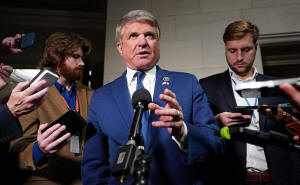Despite Navalny, it will be weeks before US House considers Ukraine aid
 Send a link to a friend
Send a link to a friend
 [February 17, 2024]
By Patricia Zengerle [February 17, 2024]
By Patricia Zengerle
WASHINGTON (Reuters) -The chairman of the U.S. House of Representatives
Foreign Affairs Committee said on Friday he does not expect the
Republican-led chamber will consider President Joe Biden's request for
billions of dollars more aid for Ukraine before mid-March, after it
debates broader spending bills.
"I don't want to speak for the speaker, but I do think he wants to get
through the appropriations process first- that takes us to March 8 - and
then deal with the supplemental," Republican Representative Michael
McCaul told journalists at a breakfast sponsored by the Christian
Science Monitor.
The Senate, controlled by Biden's fellow Democrats, passed a$95.34
billion military aid package for Ukraine, Israel and other allies
shortly before dawn on Feb. 13, but Republican House Speaker Mike
Johnson said the chamber would not rush to consider the Senate bill.
Backers of Ukraine from both parties urged Johnson to act quickly on
further assistance for Ukraine as it battles a nearly two-year-long
Russian invasion, citing Kyiv's urgent need for ammunition and other
materiel.
For some, warnings this week that Russia is developing nuclear
capabilities for space and the death of Russian opposition leader Alexei
Navalny on Friday intensified calls for assistance for Ukraine.
Lawmakers have been proposing ways to pass a bill, either by using
procedural tools to sidestep Johnson or by writing new bills that might
make the aid package more palatable to hardliners, who question sending
money abroad at a time of steep U.S. deficits or demand that tighter
controls on immigration via the border with Mexico be included.

A bipartisan group of centrist House members introduced a bill including
measures to secure the border and money for defense of Ukraine, Israel
and Taiwan, but not economic support for Kyiv.
McCaul said he had not read the bill closely but had concerns, including
over its proposed changes in military funding. "I don't think this is
well thought out," he said.
[to top of second column]
|

U.S. Representative Michael McCaul (R-TX) speaks to reporters
after House Majority Leader Steve Scalise (R-LA) won a majority of
votes in the House Republican caucus to be their nominee for next
Speaker of the House during a Republican meeting held behind closed
doors in the Longworth House office building on Capitol Hill in
Washington, U.S., October 11, 2023. REUTERS/Kevin Lamarque/File
Photo

McCaul, like many other Republicans as well as Democrats, said the
security assistance bill would pass the House if Johnson allowed a
vote, despite opposition from a vocal group of lawmakers most
closely allied to former President Donald Trump.
"There are some that I don't think can be persuaded because the
narrative is so strong," McCaul said. "I think the brainwashing, if
you will, that we have to choose between our southern border and
Ukraine has been out there. I don't agree with that. ... I think
we're a great nation and we can do both."
Besides saying that pulling out of Ukraine risked emboldening U.S.
adversaries, McCaul stressed that much of the money in the security
aid bill would go to U.S. defense companies as the country's
military stocks are replenished.
Trump has criticized the Senate bill on social media by saying the
foreign aid should take the form of a loan. McCaul said it was
possible that an eventual House Ukraine bill could use a loan, or
the seizure of Russian assets, to cover economic support for Kyiv.
Congress last month passed a stopgap spending bill to fund the
federal government only through early March, facing deadlines of
March 1 and March 8 for completing action on spending for federal
agencies or facing a government shutdown.
(Reporting by Patricia Zengerle; editing by Jonathan Oatis, Kirsten
Donovan)
[© 2024 Thomson Reuters. All rights reserved.]This material
may not be published, broadcast, rewritten or redistributed.
Thompson Reuters is solely responsible for this content. |